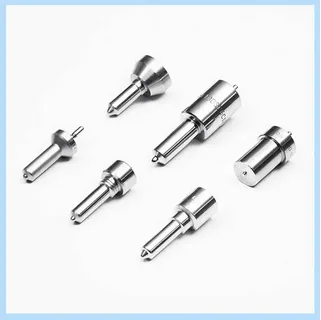How Advanced Injector Nozzles Enhance Engine Performance

Introduction
The Automotive Injector Nozzle Market is expanding steadily as modern vehicles demand efficient fuel delivery systems to enhance combustion, performance, and emission control. Injector nozzles are critical components in fuel injection systems, responsible for atomizing fuel into fine particles and ensuring precise delivery into the combustion chamber. With stricter emission norms globally and increasing adoption of fuel-efficient and high-performance engines, injector technology has evolved significantly—from mechanical injectors to electronic, high-pressure, and direct injection systems. The market is projected to grow at a CAGR of around 5–6% over the forecast period, driven by rising vehicle production, demand for cleaner mobility, advancements in fuel injection technology, and hybrid vehicle penetration. As automakers transition toward advanced combustion systems, injector nozzles are becoming increasingly essential for achieving optimal engine efficiency, power output, and emission compliance.
Market Drivers
Tightening emission regulations worldwide are compelling OEMs to deploy advanced fuel injection systems to reduce particulate matter, NOx, and CO₂ emissions. Increased demand for high-performance, fuel-efficient vehicles is driving adoption of high-pressure injector nozzles that enhance combustion efficiency. Growing sales of passenger and commercial vehicles in emerging markets are boosting demand for injector nozzle components. Rapid adoption of gasoline direct injection (GDI) and common rail direct injection (CRDI) systems in diesel engines supports market growth. Hybrid vehicles, which still rely on internal combustion engines for power generation, require precise fuel delivery to maximize efficiency. Technological advancements such as multi-hole nozzles, needle control systems, and electronically controlled injectors are further propelling the market. Additionally, the aftermarket sector contributes significantly due to replacement needs arising from injector wear or fuel contamination.
Market Challenges
Transition toward electric vehicles poses a long-term challenge for injector nozzle demand, as EVs eliminate the need for combustion-based fuel systems. High manufacturing costs associated with precision engineering, advanced materials, and electronic control components increase product pricing. Injector nozzle performance is highly sensitive to fuel impurities, leading to clogging, wear, and costly maintenance or replacement. Stringent durability, efficiency, and emission standards require continuous R&D investments, impacting manufacturer margins. Variations in global fuel quality—especially in developing markets—affect injector lifespan and functionality. Counterfeit and low-quality injector nozzles in the aftermarket pose risks to engine performance and emissions, affecting brand trust. Additionally, complex integration with modern ECU-controlled fuel systems demands high technical expertise.
Market Opportunities
Growth in hybrid vehicles provides strong opportunities for injector nozzle manufacturers as hybrids require highly efficient combustion for maximum fuel economy. Development of lightweight, corrosion-resistant, and high-strength materials for injector nozzles can significantly enhance durability and reduce wear. Increasing demand for turbocharged GDI and CRDI engines offers scope for high-pressure, multi-spray pattern injector nozzles. Aftermarket fuel injector cleaning, maintenance, and replacement services present revenue potential in regions with aging vehicle populations. Innovations such as piezoelectric injector nozzles, ultra-high-pressure fuel injection, and optimized spray targeting for alternative fuels open new market prospects. Adoption of biofuels, synthetic fuels, and hydrogen-blended fuels requires specialized injector designs, creating opportunities for diversification. Collaboration between OEMs, fuel system suppliers, and research institutions will accelerate development of next-generation injection systems.
Regional Insights
Asia-Pacific dominates the Automotive Injector Nozzle Market due to large vehicle production capacity, expanding automotive manufacturing, and rising consumer demand across China, India, Japan, and South Korea. China leads due to strong adoption of CRDI and GDI engines and government emission compliance targets. Europe holds a significant share, driven by strict emission regulations, advanced automotive engineering, and high adoption of fuel-efficient engine technologies across Germany, France, and Italy. North America shows steady growth due to high demand for high-performance vehicles, trucks, and SUVs, coupled with strong aftermarket replacement demand. Latin America, the Middle East, and Africa are emerging markets, with long-term growth tied to improving fuel standards, rising vehicle ownership, and gradual adoption of direct injection systems.
Future Outlook
The future of the Automotive Injector Nozzle Market will be shaped by fuel efficiency innovations, alternative fuels, and hybridization. Ultra-high-pressure injectors with improved atomization capabilities will become standard to meet future emission norms. Integration of AI and simulation tools in injector design will enable precision spray optimization and enhanced combustion control. Hydrogen and synthetic fuel compatibility will emerge as key development areas as the world moves toward low-carbon mobility. Hybrid vehicles will continue to sustain injector nozzle demand during the EV transition phase. Self-cleaning injector technologies and advanced coatings will improve longevity and reduce maintenance needs. As global emission norms tighten further, injector nozzles will remain at the core of high-efficiency powertrain development for at least the next decade.
Conclusion
The Automotive Injector Nozzle Market is evolving as the automotive industry focuses on cleaner, more fuel-efficient, and high-performance engine technologies. Injector nozzles are essential for achieving precise fuel combustion, emission reduction, and optimized engine performance. While EV adoption presents long-term challenges, innovations in injector design, hybrid engine growth, and adoption of direct injection systems are sustaining market momentum. Advanced materials, smart injectors, and alternative fuel compatibility will shape the next wave of innovation. With rising vehicle production, regulatory pressure, and increasing aftermarket demand, the injector nozzle market is positioned for stable growth as manufacturers adapt to the future of efficient combustion and hybrid mobility.
- Art
- Causes
- Crafts
- Dance
- Drinks
- Film
- Fitness
- Food
- Jogos
- Gardening
- Health
- Início
- Literature
- Music
- Networking
- Outro
- Party
- Religion
- Shopping
- Sports
- Theater
- Wellness
